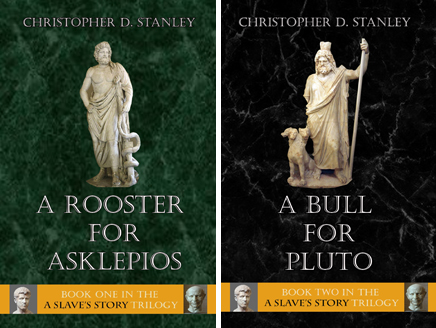Jul 21, 2020
During the last three decades, Dr. Chris Stanley has accumulated a long list of academic publications on the history and literature of early Christianity, including three authored books, three edited books, and dozens of professional articles. Now the St. Bonaventure University theology professor has turned his hand to fiction.
“A dozen years ago my wife suggested that I consider writing a historical novel to share the fruits of my historical research with ordinary readers,” said Stanley. “My first reaction was to dismiss the idea; I had never given a thought to writing fiction. But over the next few days, the broad storyline and many of the details of such a novel came together in my mind. I shared my ideas with my wife, who liked what I was doing and encouraged me to continue. The rest, as they say, is history.”
Turning those ideas into a full-scale novel, however, took longer than Stanley expected. Not only did he have several academic books, articles, and conference papers to write, but he also wanted to ensure that every detail of the story was as historically accurate as he could make it. A massive amount of research was required to achieve that goal, including two trips to Turkey to visit sites where the novel takes place.
By the time he was done, the story filled nearly 1,000 single-spaced pages. This turned out to be too long for most literary agents to consider, so he divided it into two separate books while also laying out the broad framework for a future third volume that will complete the story, forming a trilogy. The first two books are now listed for sale on Amazon.
“The storyline of the first two books covers a year in the lives of two closely entwined characters,” said Stanley, “a wealthy Roman aristocrat and the trusted slave who manages his business affairs. The story takes place in a neglected corner of the ancient world, the Roman colony of Pisidian Antioch in central Asia Minor (modern Turkey). Most of the historical material that forms the background of these stories has never been addressed in a work of fiction.”

The first book in the series, “A Rooster for Asklepios,” follows the two main characters on an eventful journey across western Asia Minor to a famous healing shrine, where the master is convinced that the Greek healing god Asklepios will cure him from a nagging illness. The second volume, “A Bull for Pluto,” relates the fateful consequences of this journey for both men.
Both books draw heavily on Stanley’s academic research on the social world of the early Roman Empire, where the stories take place. Both pay particular attention to the central role of religion in the ancient world, whether Greek, Roman, Jewish, or Christian.
“The novels are not ‘religious’ in the sense of promoting any particular faith, but they do help contemporary readers to understand the religious world in which Judaism and Christianity arose,” said Stanley.
One of his chief aims in writing these books — besides telling what he hopes is an engaging story — was to immerse readers in the lived realities of ordinary people in the early Roman empire, a world with very different beliefs, values, and practices than those we take for granted today.
“People who have read the books seem to agree that they make the ancient world ‘come alive’ for modern readers,” added Stanley.
“A Rooster for Asklepios” and “A Bull for Pluto” are available for purchase on Amazon.com. Stanley has also created a Website with additional information about both books at aslavesstory.com, and he will soon start posting about the books on Facebook, Twitter, and Instagram. Search for “aslavesstory” to follow him. He also welcomes questions and comments by e-mail at cstanley@sbu.edu.